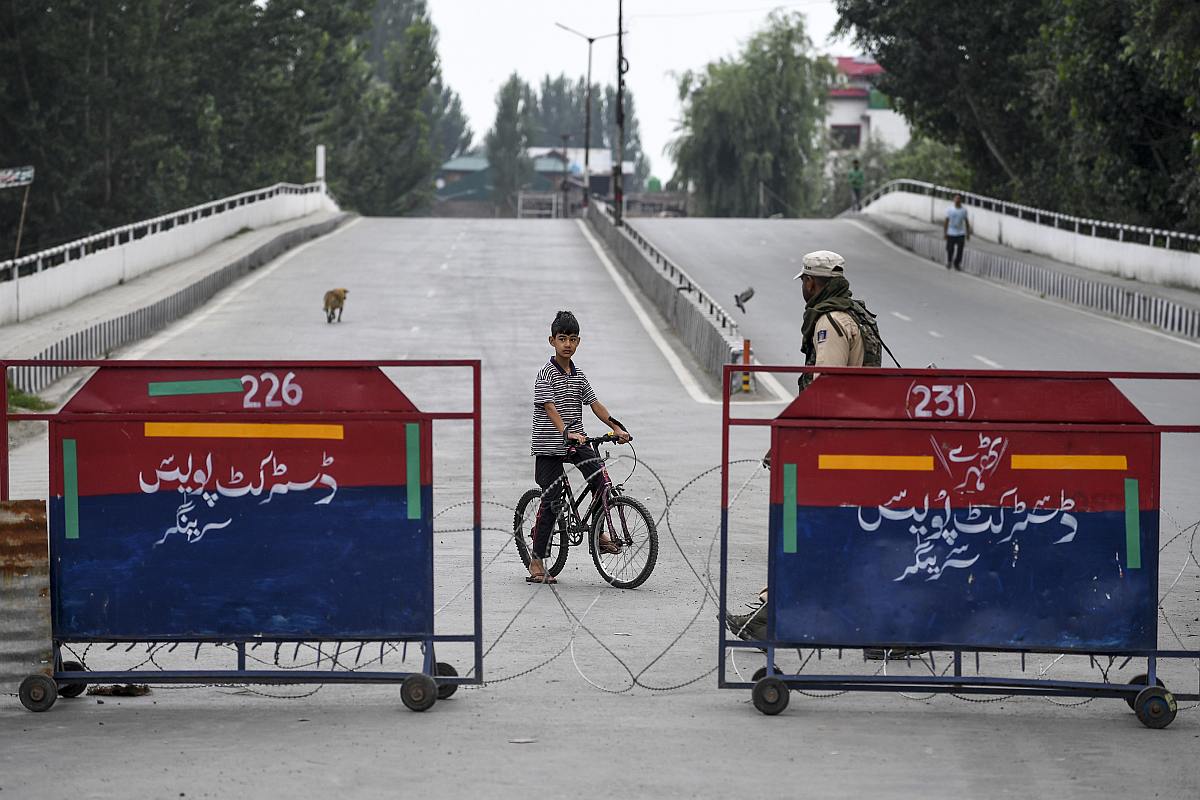Congress, allies sabotaged Jammu’s national projects: Dr Jitendra Singh
The minister further alleged that the Congress also denied 4% reservation to the people living along the International Border in this region.
Last month two members of the US House of Representatives also wrote to Secretary of State Mike Pompeo to take notice of the communication blackout in Kashmir.

Indian soldier stands guard next to a barricade on a deserted street as a child on a bicycle looks on during a curfew in Srinagar. (Photo by SAJJAD HUSSAIN / AFP)
With more than two months of communication block and curfews in Kashmir, Democratic Senator Mark Warner, who is co-chair of the Senate India Caucus, on Tuesday said that he is “disturbed by restrictions” on communications and movement of people in Jammu and Kashmir and asked the government to live up to democratic principles by allowing freedom of press, information and political participation.
Restrictions were imposed when the BJP government in Centre revoked Jammu and Kashmir’s special status under Article 370 of the Constitution and bifurcated it into two Union Territories, Jammu and Kashmir, and Ladakh on August 5.
Senator Warner tweeted his concern as he quoted a New York Times article which went by the headline, “In Kashmir, a Race Against Death, With No Way to Call a Doctor”
Advertisement
“While I understand India has legitimate security concerns, I am disturbed by its restrictions on communications and movement within Jammu and Kashmir,” Senator Warner tweeted.
“I hope India will live up to its democratic principles by allowing freedom of press, information, and political participation,” said the top Democratic Senator from Virginia, who has joined his other Senate colleagues from the Democratic party in calling India to lift restrictions.
While I understand India has legitimate security concerns, I am disturbed by its restrictions on communications and movement within Jammu and Kashmir. I hope India will live up to its democratic principles by allowing freedom of press, information, and political participation. https://t.co/5xlWTE6ANu
— Mark Warner (@MarkWarner) October 8, 2019
The New York Times article mentioned how people of Kashmir have not been able to avail medical aid due to communication block and multiple checkpoints which they have to cross from their homes to hospitals. The article mentioned, “Cancer patients who buy medicine online have been unable to place orders. Without cell service, doctors can’t talk to each other, find specialists or get critical information to help them in life-or-death situations. And because most Kashmiris don’t have landlines in their homes, they can’t call for help.”
Last month two members of the US House of Representatives also wrote to Secretary of State Mike Pompeo to take notice of the communication blackout in Kashmir.
In a letter to Secretary Pompeo dated September 11, Pramila Jayapal, the first and the only Indian-American Congresswoman in the House of Representatives, and Congressman James P McGovern said the international media and independent human rights observers must immediately be allowed into Jammu and Kashmir.
“We urge you to work across the Administration to press the Indian Government to immediately end its communications blackout of Kashmir, expedite the process of reviewing and releasing individuals ‘preventatively’ detained, ensure hospitals have access to life-saving medicines and protect the rights of the Kashmiri people to freedom of assembly and worship,” the letter states.
I continue to be deeply concerned about credible reports of a humanitarian crisis in Jammu & Kashmir. Even in complex situations, we look to strong democratic allies like India to uphold basic human rights and due process.
Read my letter with @RepMcGovern to @SecPompeo ⬇️ pic.twitter.com/sVwVwXFyWy
— Rep. Pramila Jayapal (@RepJayapal) September 11, 2019
Tagging the letter in a tweet, Ms Jayapal said, “I continue to be deeply concerned about credible reports of a humanitarian crisis in Jammu & Kashmir. Even in complex situations, we look to strong democratic allies like India to uphold basic human rights and due process.”
The Indian government has repeatedly denied reports of human rights violation, even at the 42nd session of UNHRC in Geneva on September 10. The government of India has repeatedly denied reports of International media and human rights organisation and has justified detention of political leaders and many civilians as a ‘preventative measure’ while also claiming that everything is ‘normal’ in Kashmir since it revoked its special status.
Advertisement